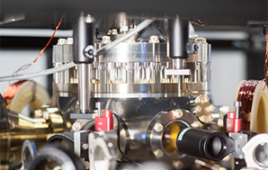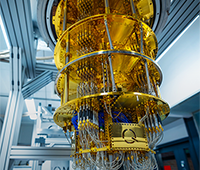CERN Openlab to Tackle Exascale IT Challenges
The fourth phase of CERN — the European Organization for Nuclear Research — openlab was officially launched during a meeting of its board of sponsors taking place at CERN on May 8 and 9, 2012. CERN openlab is a unique public-private partnership between CERN and HP, Intel, Oracle and Siemens, with contribution from Huawei for this new phase. Its mission is to accelerate the development of cutting-edge solutions to be used by the worldwide community working on LHC data.
The Large Hadron Collider (LHC), the world’s largest particle accelerator, generates hundreds of millions of particle collisions each second. To record, store and analyze these vast amounts of collisions presents a massive data challenge: the LHC produces roughly 20 million Gigabytes of data each year.
CERN openlab was created more than 10 years ago, to develop innovative, advanced IT systems required to cope with the unprecedented computing challenges of the LHC. It brings together the efforts of science and industry, working at the cutting-edge of research to ever expand technological boundaries. This collaborative framework also offers a neutral ground for companies to collaborate on common projects and develop synergies.
The third phase of CERN openlab was officially closed during the meeting of partners. The assembly reviewed key achievements of the projects carried out, and agreed on their positive impact on the development of the Grid and computing services, which underpin the LHC. The work was organized into four competence centers: Automation and Controls with Siemens, Database with Oracle, Networking with HP, and Platform with Intel.
During the meeting, Rolf Heuer, CERN Director General, stated that “The synergy that CERN openlab creates with leading IT companies is highly fruitful and I, therefore, thank all CERN openlab partners and contributors for their continued support. During the next three years, CERN is preparing the LHC for operating at higher energy and luminosity. This fourth phase will be instrumental in addressing the increased computing challenges in an innovative way.”
The fourth phase will address new topics crucial to the CERN scientific programme, such as cloud computing, business analytics, the next generation of hardware, and security for the myriads of network devices. The industry investment over the three years of the fourth phase represents more than eight million Swiss Francs.
Frédéric Hemmer, Head of the IT Department at CERN added: “In 2011, the LHC experiments took data at rates and volumes exceeding the most optimistic forecasts. In such a demanding environment, agility is a key requirement for the computing infrastructure but also a challenge in itself. In this context, the collaboration with the IT industry in the CERN openlab framework is an outstanding catalyst to sustain a steady stream of innovative solutions.”
The four partner companies summarized the projects’ results of the third phase and presented plans for CERN openlab IV.
“As one of the world’s most demanding and sophisticated IT infrastructures, CERN is an ideal environment for the two projects HP is conducting through openlab: the first is focused on developing algorithms and strategies for large-scale wireless deployment that optimize network resource management; the second project intends to leverage CERN’s infrastructure and experience with large-scale data acquisition networks by developing network virtualization solutions using OpenFlow and Software-defined Networking technologies. The first project (wireless) is in its final phase, while the second project (OpenFlow) is a new openlab IV project,” stated Bill Johnson, Senior Director of Research and Development for HP Networking.
“We are very proud to have been a part of CERN openlab since 2003. The renewed agreement marks a decade of joint research by the two organizations,” said Christian Morales, Intel Vice President and General Manager, Europe, Middle East, Africa. “The CERN team is conducting impressive research. We are honored to be continuously challenged by CERN to improve performance, energy efficiency and security solutions in our products, technologies and solutions. CERN openlab is strategic in our European R&D network, Intel Labs Europe.”
“As we increase and strengthen our focus in the Research Industry segment, with our new Research Industry solutions, CERN openlab IV will offer Oracle the opportunity to continue to develop, test and validate our technology,” says Monica Marinucci, EMEA Director for Research at Oracle. “Research data management and analytics, as well as virtualization and enterprise management solutions will be the focus areas for Oracle to best contribute to the success of the laboratory. We are proud to renew our commitment to openlab, particularly this year in which Oracle and CERN celebrate their 30th year of fruitful collaboration.”
According to Thomas Hahn from Siemens Corporate Technology: “Recent CERN openlab contributions over the past three years successfully focused on improving security, as well as handling huge amounts of data. Cooperation in the fourth phase will address the aggregation of this data into business intelligence and business analytics and, thus, lead to further improvements in the area of high-performance industrial control.”
Huawei has joined CERN openlab IV as a contributor for a year and participated for the first time in the meeting. Huawei’s representative, James Hughes, Cloud Storage Chief Architect, stated: “I am proud Huawei and CERN are jointly working on innovative cloud storage system solutions allowing scaling and providing high performance.”
Bob Jones, Head of CERN openlab, thanked all participants and concluded: “CERN openlab has established itself as a reference, thanks to the excellent relationship and on-going commitment of all partners and contributors during the past 11 years. The combined knowledge and dedication of the engineers from CERN and the companies have produced remarkable results. The launch of this fourth phase is an exciting time for CERN openlab, and I am confident that we will be equally successful in the future.”



